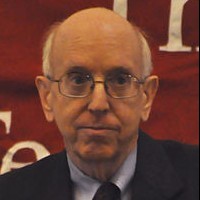Posner rejects pattern jury instruction while sitting as trial judge and gets reversed

Judge Richard Posner of the Chicago-based 7th U.S. Circuit Court of Appeals
Judge Richard Posner of the Chicago-based 7th U.S. Circuit Court of Appeals has made clear his disdain for legal jargon and pattern jury instructions that are “largely unintelligible to jurors.”
But his objection to the legal jargon in a pattern instruction, while sitting by designation as a trial judge in February 2016, has resulted in the reversal of a conviction for witness tampering. How Appealing notes last Thursday’s decision by a 7th Circuit panel, which remanded for a possible new trial.
Posner has said he writes his own jury instructions when he conducts trials as a volunteer in his circuit’s district court. Posner believes appellate judges should have trial experience, and sitting by designation as a trial judge is a good way to get that experience.
The defendant in the case heard by Posner was Enkhchimeg Ulziibayar “Eni” Edwards, a customs agent at O’Hare Airport in Chicago. She was convicted of witness tampering and making false statements in February 2016 for impeding a federal investigation into a sham marriage she had arranged for a relative, according to a Justice Department press release and the Chicago Sun-Times.
When she applied for the customs job, Edwards said she had never helped anyone enter or stay in the country illegally.
The appeals court affirmed Edwards’ false statements conviction. But the court reversed the witness tampering conviction because Posner refused to instruct jurors that prosecutors had to prove Edwards had “corruptly” attempted to persuade another person to interfere in a government investigation.
Posner had refused to include the word “corruptly” in his instruction, telling lawyers in a pretrial conference: “No one knows what ‘corruptly’ means. Then there’s a definition, a person acts corruptly if he or she acts with the purpose of wrongfully impeding the due administration of justice. Well, that doesn’t help. You don’t need ‘corruptly.’”
Defense counsel had protested that eliminating “corruptly” would lower the government’s burden of proof, but Posner disagreed. He said leaving out the word would not harm the defense, “unless you’re counting on obscurantism in leading [the jury] to acquit.”
The appeals court disagreed with Posner’s decision, calling “corruptly” proof an essential element of the witness tampering charge.
Though pattern instructions are “not holy writ” and judges can rewrite them, the revised instructions have to have every element of the crime, the appeals court said.
The appeals court had published the pattern instruction and Posner’s revision. The pattern instruction read, in part:
In order for you to find [a; the] defendant guilty of this charge, the government must prove each of the [four] following elements beyond a reasonable doubt:
1) The defendant [[attempted to] [use[d] intimidation, threaten[ed] or corruptly persuade[d] another person]] or [engaged in misleading conduct toward another person]; and
2) The defendant acted knowingly; and
3) The defendant acted with the intent to hinder, delay or prevent the communication of information to [a law enforcement officer of the United States or judge of the United States]; and
4) Such information related to the commission or possible commission of a [[federal offense] or [violation of conditions of probation], [supervised release], or [release pending judicial proceedings]].
The definition of “corruptly” in the pattern instruction is: “A person acts ‘corruptly’ if he or she acts with the purpose of wrongfully impeding the due administration of justice.”
Posner’s instructions read:
Remember that you can find the defendant guilty only if the government proves the following four things beyond a reasonable doubt:
1) The defendant attempted to persuade another person to interfere with the government’s investigation or prosecution of illegal activity;
2) She did this deliberately, knowing what she was doing rather than acting in ignorance or by mistake;
3) She intended to interfere with, delay, or prevent another person from giving information to a federal law enforcement officer;
4) That information related to a federal offense that someone had committed, may have committed, or was planning to commit.
Posner had imposed a below-guidelines sentence of two years of probation and a $2,000 fine. Edwards will be resentenced on remand.



